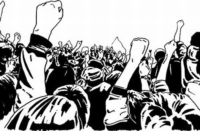This is an old story that is told in Marxist circles, still relevant, and never loses its novelty. It’s a conversation between a little girl and her mother during a cold winter evening in London when the father has not returned after going out in search of a job.
The two are sitting in front of a fire whose flames are getting shorter.
Girl: Mother, put on some more coal. I’m feeling cold.
Mother: This is the last piece of coal we have, dear. We have none after this.
Girl: Why can’t you buy some?
Mother: We haven’t got the money, dear.
Girl: Why?
Mother: Because Father lost his job.
Girl: Why?
Mother: Because he and his friends, working hard in the coal mines, dug out coal that is left unsold, and they had to stop mining.
Girl: Why was it not sold?
Mother: Because people couldn’t afford to buy it.
Girl: So in spite of Father and his friends digging out so much coal, we are left with no coal to keep ourselves warm?
The conversation ends there, because the mother had no answer. But the person who knew the answer was Karl Marx.
In this story there is an abundance of coal at one end, and there is a need for coal at the other. The reason they were not able to obtain it is the contradiction of capitalism. That’s the moral of the story.
The way to resolve this contradiction is to go beyond capitalism—that is, to change the way things are produced and distributed, which means socialism.
The worker who enters the market as a seller of his commodity (labour power) is at the same time a buyer (of other commodities he or she needs). So in a society where labour power is exploited, the capacity to buy is also decreased, which shrinks the market, resulting in crisis.
Capitalism is already in a structural crisis, which means that the measures it takes for coming out of crisis land it in deeper crisis. These structural crises give a lot of opportunities for the working class to fight back.
But whether the working class seizes the opportunity depends on whether the left forces are strong enough. Unfortunately, the left forces all over the world are weak; as Arundhati Roy once said, “capitalism is dead, but there is no one to remove the stinking corpse.” The working class is swayed by nationalist feelings: that is why wars are created during crisis, which overtakes class identification, and the fascist forces being unleashed to suppress even the spontaneous struggles.
The hope lies in creating bonds with the left forces all over the world by standing in solidarity with each other’s struggle and engaging with the spontaneous outburst of protests.
We have to think how the death of millions of people from covid-19 is normalised, how hunger and long queues at food banks are normalised, how the crisis that is overcome by further exploitation of workers is normalised, how inflation and the flattening of real wages is normalised, how the grave danger of climate catastrophe is swept under the carpet, how war crimes of the imperialist countries are accepted without any guilt by the people of those countries, and how consent is manufactured.
If we don’t find answers to these questions, the rights that we have won by sacrifice, which are being snatched away by the ruling class, will be a distant dream to our next generation.
If we fail in discharging our historic duty of fighting this mode of production, forgetting all our petty quarrels and minor differences, we will be doing a severe injustice to the future generations, who will never forgive us, or there will be none left to forgive.






